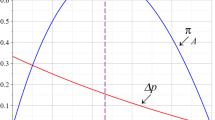Abstract
The result of a referendum delivers a significant amount of information about social preferences to each composite member of the society. This paper argues that, beyond this obvious fact, the choice of an authority not to offer a referendum, although permitted to do so, may enhance the information individuals posses about social preferences as well. The addition of a referendum option in the rules of a game, that is, by enabling the authority to offer referenda at will, results in an assured re-election of the authorities that implement socially beneficial policies and reduces the likelihood of the re-election of the authorities that implement socially detrimental policies. In a sense, by allowing an authority to offer referenda, an inescapable Catch-22 is introduced in the game, which inhibits the re-election of a measure of “bad” authorities and, thus, confirms that one of the main benefits of a democratic institution is the preservation of “good” authorities in power. It is, finally, demonstrated that non-binding referenda are more influential (in the directions described above) than binding referenda as far as the authority’s re-election prospect is concerned.
Similar content being viewed by others
References
Aghion Ph, Tirole J (1997) Formal and real authority in organizations. J Political Econ 105: 1–29
Banks J (1990) Monopoly agenda control and asymmetric information. Q J Econ 105: 445–464
Brams S, Jones C (1999) Catch-22 and King-of-the-Mountain games. Ration Soc 11: 139–167
Budge I (1996) New challenge of direct democracy. Polity Press, Cambridge
Caillaud B, Tirole J (2006) Consensus building: how to persuade a group. PSE Working Papers 2006-19
Cho IK, Kreps D (1987) Signaling games and stable equillibria. Q J Econ 102: 179–221
Cronin TE (1989) Direct democracy. The politics of initiative, referendum and recall. Harvard University Press, Cambridge, MA
Denzau A, Mackay R (1983) Gatekeeping and monopoly power on committees. An analysis of sincere and sophisticated behavior. Am J Political Sci 27: 740–761
Downs A (1957) An economic theory of democracy. Harper & Row, New York
Feld LP, Savioz MR (1997) Direct democracy matters for economic performance: an empirical investigation. Kyklos 50: 507–538
Frey BS (1994) Direct democracy: politico-economic lessons from Swiss experience. Am Econ Rev 84(2): 338–342
Frey BS, Stutzer A (2000) Happiness, economy and institutions. Econ J 110: 918–938
Frey BS, Stutzer A, Benz M (2004) Introducing procedural utsility: not only what, but also how matters. J Inst Theor Econ 160(3): 377
Grossman LK (1995) The electronic republic: reshaping democracy in the information age. Viking Penguin, New York
Hotelling H (1929) Stability in competition. Econ J 39: 41–57
Klor EF, Winter E (2007) The welfare effects of public opinion polls. Int J Game Theory 35: 3
Lupia A (1992) Busy voters, agenda control, and the power of information. Am Political Sci Rev 86: 390–403
Romer T, Rosenthal H (1978) Political resource allocation, controlled agendas, and the status quo. Public Choice 33: 27–44
Samuelson P (1983) Foundations of economic analysis. Harvard University Press, Cambridge, MA
Sen AK (1986) Social choice theory. In: Arrow KJ, Intrilligator MD (eds) Handbook of mathematical economics, chap 22, vol III. Elsevier Science, Amsterdam
Spence M (1973) Job market signaling. Q J Econ 87: 335–374
Author information
Authors and Affiliations
Corresponding author
Rights and permissions
About this article
Cite this article
Xefteris, D. Referenda as a Catch-22. Soc Choice Welf 37, 121–138 (2011). https://doi.org/10.1007/s00355-010-0483-4
Received:
Accepted:
Published:
Issue Date:
DOI: https://doi.org/10.1007/s00355-010-0483-4




